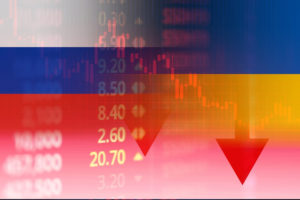
Your Survival Guy’s been ranting and raving ad nauseam lately about the pitfalls of ESG investing where you invest, and they win.
You know from my past posts that it’s basically a fee grab designed to line the pockets of investment firms.
At the core of green energy and the Great Reset are money and power. They control the pieces and the money. If we let them. And that’s where being vigilant about how you invest and with whom you invest becomes paramount.
When you simply ask, “What’s in it for them?” in rolls the fog. Follow the money. Solar panels and heat pumps will not be the savior of the long dark winters many of us experience. Do they even know how they sound pushing this stuff on us?
Look what happened to these same characters when they invested in Russian and Ukrainian bonds in their ESG funds. Matt Wirz reports for the Wall Street Journal:
Investors who bought a $2.1 billion BlackRock emerging-markets bond fund that tracks a JPMorgan ESG index have lost 4.74% since the invasion began, compared with a 3.78% loss for investors in its traditional emerging-markets fund, according to data from S&P Capital IQ. The ESG fund underperformed because it had relatively large allocations to Russian and Ukrainian government bonds and was slightly more sensitive to U.S. interest-rate moves, people familiar with the matter said.
The overexposure traces back to data JPMorgan buys from ESG-scoring companies such as Sustainalytics and to its index methodology, people familiar with the product said. JPMorgan, a self-styled leader on sustainability in finance, said within weeks of the invasion that it would cut Russia from its indexes.
“It becomes a question of whether the index owners are allocating capital appropriately,” said Fergus McCormick, director of sovereign research at Emerging Markets Investors Alliance, a nonprofit promoting good governance. “We had a lot of signals that some investors and analysts were taking the Russia risk seriously, but the industry as a whole was lulled into complacency.”
Money managers are rolling out sustainable investing in virtually every market from stocks and bonds to commodities and private equity, leaving regulators and investors to grapple with what qualifies for the label and what it even means.
Analysts and investors who don’t employ ESG strategies were also blindsided by Russia’s attack and the extent of the West’s retaliation. Credit rating firms ranked Russia as investment-grade in mid-February. Still, advocates of sustainable investing have touted it as a way to reduce reputational and political risk for their clients by accounting for such factors as carbon footprint, civil liberties and access to education.
“Bond investors’ main ESG focus is on mitigating downside risk,” BlackRock has said in promotional materials for its funds.
Action Line: Listen, there’s more of us than them. There’s a way forward. I hope you’re with me.



